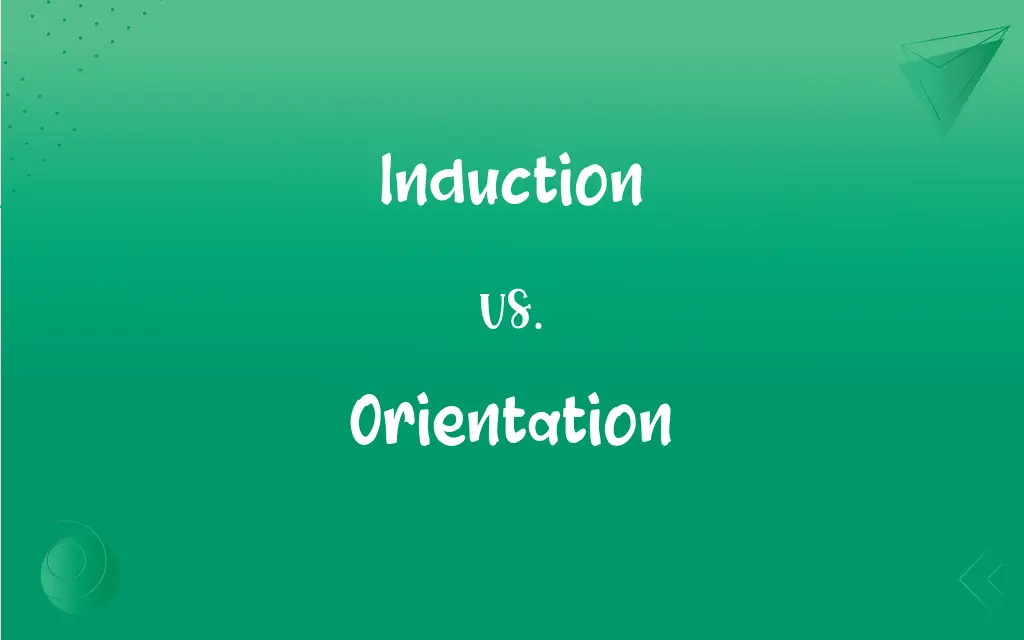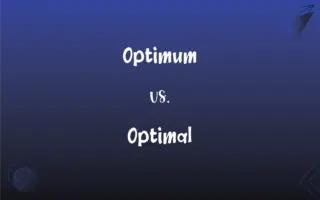Induction vs. Orientation: What's the Difference?
Edited by Aimie Carlson || By Harlon Moss || Updated on October 16, 2023
Induction is the formal introduction of a new employee to a company or position, while orientation provides specific job-related details and training.

Key Differences
Induction is a process that welcomes a new employee to an organization, introducing them to the broader company culture, values, and overarching practices. It often encompasses a broader view of the company's mission, vision, and long-term objectives. On the other hand, orientation is a more specific process, designed to familiarize the new hire with their particular job role, responsibilities, and immediate work environment.
To illustrate, imagine a new recruit joining a large corporation. The induction might involve a presentation about the company's history, its founders, corporate achievements, and values that drive the organization. This gives the employee a sense of belonging and understanding of the bigger picture. In contrast, orientation would be the subsequent phase where the employee learns about their specific department, meets their immediate colleagues, gets acquainted with the tools and systems they'll use, and learns about daily routines and tasks.
Another difference lies in the timeline. Induction typically takes place over the first few days or even weeks of an employee joining a company. It aims to gradually integrate the employee into the company culture. Orientation, on the other hand, is more immediate, focusing on getting the employee ready and functional in their specific role as quickly as possible.
Furthermore, induction can sometimes be a one-time event, while orientation can be ongoing, with periodic updates as job roles evolve or new tools and systems are introduced. In essence, while induction sets the stage and provides context, orientation prepares the employee for action.
Comparison Chart
Primary Purpose
Introduce the employee to company culture and values.
Familiarize employee with specific job role and responsibilities.
ADVERTISEMENT
Scope
Broader company view.
Specific job-related details.
Timeline
Usually within the first few days or weeks of joining.
Immediate and can be ongoing.
Content
Company history, mission, values, broad practices.
Tools, systems, colleagues, daily routines, specific tasks.
Frequency
Often a one-time event.
Can be recurring with new updates or changes.
Induction and Orientation Definitions
Induction
A process to integrate a new hire into company culture and values.
The induction program made John feel more connected to the company's mission.
ADVERTISEMENT
Orientation
Training and introduction to specific job responsibilities.
Lisa's orientation included a detailed walkthrough of the software she'd be using.
Induction
The formal introduction of a new employee to an organization.
Sarah's induction at the firm was filled with presentations about the company's legacy.
Orientation
An in-depth briefing about an individual's day-to-day tasks.
During orientation, employees are given a rundown of their daily routines.
Induction
The initial phase of an employee's journey in a new company.
During induction, employees are given an overview of the company's history.
Orientation
Introduction to colleagues and immediate team members.
Orientation sessions often involve team introductions and ice-breaking activities.
Induction
A broad overview of a company's ethos and practices.
Induction sessions often touch upon the company's core values and objectives.
Orientation
Familiarizing an employee with their immediate work environment.
The orientation helped Mark identify all emergency exits in the building.
Induction
A welcoming ceremony or event for newcomers.
The CEO personally addressed all new recruits during the induction.
Orientation
Periodic updates on evolving job roles or new tools.
After the software update, there was an orientation session to acquaint everyone with the changes.
Induction
The act or an instance of inducting.
Orientation
The act of orienting or the state of being oriented.
Induction
A ceremony or formal act by which a person is inducted, as into office or military service.
Orientation
Location or position relative to the points of the compass.
FAQs
What is the primary focus of induction?
Induction focuses on introducing an employee to the company's broader culture and values.
What might be included in an orientation schedule?
An orientation schedule might include job training, team introductions, and familiarization with tools.
Who conducts orientation sessions?
Orientation sessions are often conducted by HR, direct managers, or trainers.
Is orientation a one-time process?
No, orientation can be ongoing, especially when there are updates or job role changes.
Can induction be skipped for senior employees?
While induction is usually for all new hires, some companies might tailor it based on seniority.
Is there a universal structure to induction programs?
No, induction programs vary based on company size, culture, and industry.
What if an employee misses the orientation day?
Many companies offer makeup orientation sessions or provide materials for self-paced learning.
How does orientation differ from induction?
While induction provides a broad company overview, orientation dives into specific job roles and tasks.
Why is induction important?
Induction helps integrate new hires into the company culture and instills a sense of belonging.
Can an employee get feedback during induction?
Yes, many companies seek feedback post-induction to improve the process.
Do all companies have induction programs?
While most larger companies have formal induction programs, some smaller ones might have informal introductions.
How long does induction usually last?
The duration of induction varies by company but often spans a few days to weeks.
What is the goal of orientation?
The goal of orientation is to prepare an employee for their specific job role as quickly as possible.
Are induction and orientation only for newcomers?
Primarily yes, but existing employees might undergo induction or orientation if they transition roles.
When does induction usually take place?
Induction typically occurs during the initial days or weeks after an employee joins a company.
What materials might be provided during orientation?
Orientation materials can include job manuals, tool tutorials, and departmental overviews.
Is induction only for full-time employees?
No, induction can be for any new member, be it full-time, part-time, or contractual.
Can orientation be done remotely?
Yes, with the rise of remote work, many companies offer virtual orientation sessions.
How do companies gauge the success of orientation?
Success of orientation can be measured through employee feedback, their performance, and integration speed.
Can orientation cover company values?
While orientation primarily focuses on job-specific details, it can touch upon company values in context.
About Author
Written by
Harlon MossHarlon is a seasoned quality moderator and accomplished content writer for Difference Wiki. An alumnus of the prestigious University of California, he earned his degree in Computer Science. Leveraging his academic background, Harlon brings a meticulous and informed perspective to his work, ensuring content accuracy and excellence.
Edited by
Aimie CarlsonAimie Carlson, holding a master's degree in English literature, is a fervent English language enthusiast. She lends her writing talents to Difference Wiki, a prominent website that specializes in comparisons, offering readers insightful analyses that both captivate and inform.































































